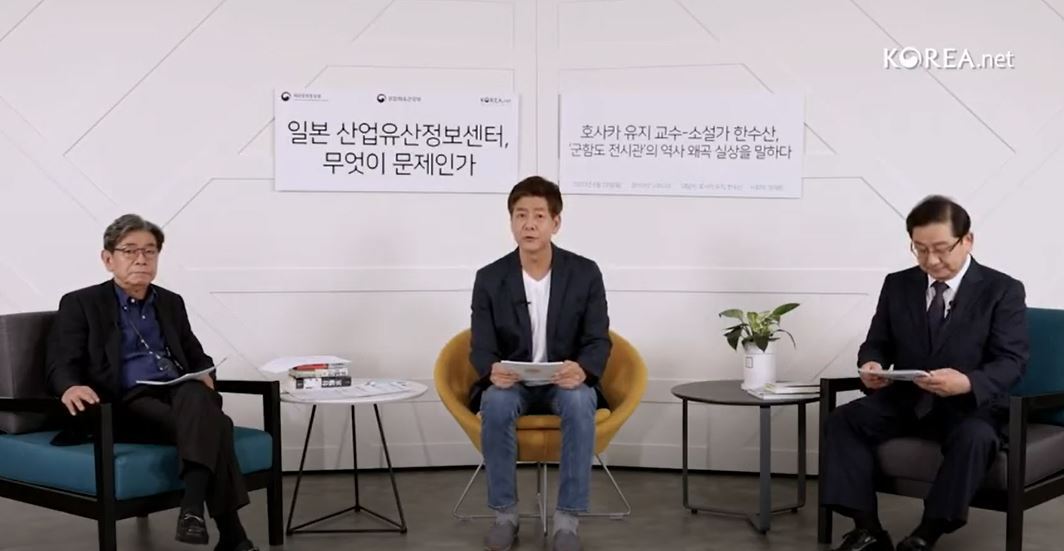Experts talk about Japan breaching promise to honor forced labor victims
By Song Seung-hyunPublished : June 30, 2020 - 17:23

Experts on Korea and Japan relations, novelist Han Su-san and political science professor Yuji Hosaka on Monday discussed the issue of Japan breaching its promise to honor forced laborers at historic industrial sites, including Hashima Island.
Hosaka is currently a political science professor at Sejong University and Han is a well-known author whose works include “Crow” and “Hashima Island,” novels based on the true stories of forced laborers during the 1910-45 Japanese colonial era.
The discussion was hosted by actor and history professor Jung Jae-hwan and organized by the Korean Culture and Information Service.
Jung started the discussion by introducing Japan’s pledge, which was made in 2015 as it sought inscription of the site on the UNESCO World Heritage List, to honor those who were forced to work in its undersea coal mines by displaying the information prominently at the Industrial Heritage Information Center in Tokyo.
However, Japan did not provide sufficient information at its new information center and also attempted to distort history, the two experts said.
Specifically, they pointed to one of the Hashima Island residents’ testimonies that is reportedly presented at the information center. The man named Fumio Suzuki claims there was no discrimination against foreigners on the island.
“It is only an exceptional case. It is like ignoring stories of 9,999 out of 10,000,” Hosaka said. “He, who was a kid at the time, claims that there wasn’t any discrimination. He claims that many people even adored him.”
Hosaka added that Suzuki’s story could be true but it is likely that Suzuki was not the son of an ordinary coal miner and that his dad was working in a managerial position.
During the talk, the two experts also talked about the salaries that forced laborers received.
“Japan’s information center reportedly claims that the forced laborers received the same amount of salary as Japanese workers,” Hosaka said. “However, the forced laborers were forced to save 20-30 percent. This money was to be returned to the laborers only when they retire. The people who decide to quit their job or run away could not get this money. The companies took it. This did not apply to Japanese workers.”
“The money, indeed, was not paid fully and was taken away from them for reasons like insurance or savings. Also, many workers were forced to move (to the sites in Japan) to serve the country under the National Mobilization Law of the time. But they still were asked to pay for housing, clothing and food. The country should have provided this money,” Han said.
The novelist also shared his experience of talking to one of the victims of forced labor on Hashima Island.
“He told me that there were beatings. Also, he said the work was too hard to the point that it became difficult to even fall asleep. But he told me that the hardest part was the hunger. I teared up thinking how hard it must have been for a 19-year-old boy,” Han said.
Hosaka also highlighted the difference between two terms -- “forced worker” and “forced laborer” -- during the discussion.
“The internationally used term ‘force laborer’ includes the meaning that there is an illegal factor. So Japan does not want to use this term. Instead, they want to use the term ‘forced worker’ which contains meaning that they were forced to work, but since it was wartime it was not illegal,” the professor said.
Toward the end of the discussion, the experts spoke on actions that Korea should take.
“Korea should also create its own exhibition center about history in Seoul,” Hosaka said. “Japan will continue to distort history. Japan already created exhibitions about Dokdo and Hashima Island in Tokyo to promote the history to the world during the Tokyo Olympics.”
“I agree that we are passive. Our country only reacts when there are distortions by Japan,” Han said. “Also, we should educate experts. Maybe send some to Japan to study history.”
The discussion was broadcast Tuesday on the Korean Culture and Information Service’s website (www.kocis.go.kr) and Korea.net’s YouTube channel (www.youtube.com/user/GatewayToKorea).
“We will also provide nine short edited video clips of the talk in English on the Korea.net YouTube channel this afternoon,” a KOCIS official told The Korea Herald on Tuesday.
By Song Seung-hyun (ssh@heraldcorp.com)












![[Today’s K-pop] BTS pop-up event to come to Seoul](http://res.heraldm.com/phpwas/restmb_idxmake.php?idx=644&simg=/content/image/2024/04/17/20240417050734_0.jpg&u=)





![[KH Explains] Hyundai's full hybrid edge to pay off amid slow transition to pure EVs](http://res.heraldm.com/phpwas/restmb_idxmake.php?idx=652&simg=/content/image/2024/04/18/20240418050645_0.jpg&u=20240418181020)

![[Today’s K-pop] Zico drops snippet of collaboration with Jennie](http://res.heraldm.com/phpwas/restmb_idxmake.php?idx=642&simg=/content/image/2024/04/18/20240418050702_0.jpg&u=)